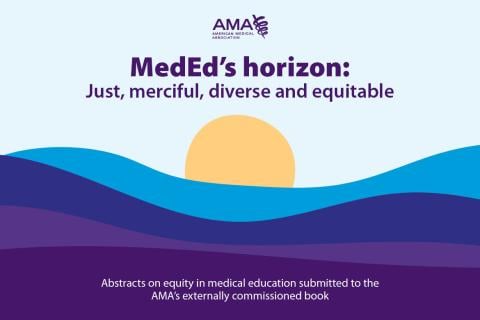
- Overview
- Competency-based medical education
- Equity, diversity and belonging
- Precision education
- Transitions across the continuum
Contents
Equity, diversity and belonging
The primary role of medical education is to produce a competent health care workforce capable of meeting the health care needs of our population. Therefore, the central goal of our health care workforce must be the elimination of health inequity.
The health care workforce as historically and conventionally conceived has not accomplished this goal, and in many ways has contributed to and compounded the problems. The effort to develop a workforce capable of addressing health inequity will produce a number of outcomes. Increased diversity and an improved sense of belonging will be among the most notable. This is the perspective that informs the work to which our team is dedicated. Specific examples are outlined below.
Statement on improving health through DEI
Recently leading health care and medical associations from across the country made a statement in support of DEI policies in health care, as a means to help improve the health of our nation.
Affirmative action in medical education
In 2023 the U.S. Supreme Court announced a ruling that restricts medical schools from considering race and ethnicity among the multiple factors in admissions policies.
The AMA recently adopted a policy on race-conscious admissions in higher education and has produced several resources and commentaries on affirmative action in medical education. The following is a selection of materials related to the ruling and diversity in medical education.
Policy
Press release
AMA news
- High court sets back efforts to diversify medicine, improve care
- AMA adopts policy for race-conscious admissions in higher education
- AMA: Don’t back down on diversity in medicine
Videos
- April 26, 2024: Navigating the Horizons: Understanding the Impact of DEI Legislation on Medical Training – National Medical Association webinar
- Affirmative action in medical education: Unpacking the Supreme Court Decision
- View and earn CME credit: Affirmative Action in Med Ed: Exploring the Consequences of an Adverse Supreme Court Decision
- AMA Update: Affirmative action ends: How Supreme Court ruling impacts medical schools & the health care workforce
AMA externally commissioned book
In 2021 the AMA Council on Medical Education issued a resolution requesting that the “AMA work with appropriate stakeholders to commission and enact the recommendations of a forward-looking, cross-continuum, external study of 21st century medical education focused on reimagining the future of health equity and racial justice in medical education, improving the diversity of the health workforce, and ameliorating inequitable outcomes among minoritized and marginalized patient populations.”
This work is underway and is being conducted by a cross-disciplinary editorial panel with broad expertise and experience in medical education.
Recently published: MedEd's horizon
MedEd’s horizon: Just, merciful, diverse and equitable is a new compendium of abstracts submitted to the AMA externally commissioned study on equity in medical education. This publication is available for download from the AMA website at no cost (registration required).
These abstracts focus on reimagining the future of health equity and racial justice in medical education; improving the diversity of the health workforce; and ameliorating inequitable outcomes among minoritized and marginalized patient populations. Over 150 groups of authors responded to the call for submissions.
Resident Diversity Leadership Program
Administered by the University of Cincinnati College of Medicine with support from the AMA, the Resident Diversity Leadership Program (RDLP) is a cohort-based leadership program for residents from backgrounds underrepresented in medicine. The program engages residents in a leadership curriculum, provides the opportunity for the participants to meet and engage with leaders in academic medicine with similar backgrounds, and helps them lead diversity, equity, and inclusion projects at their home institutions.
Current participants are in residency programs at the University of Cincinnati College of Medicine, Indiana University School of Medicine, Ohio State University College of Medicine and Virginia Commonwealth University School of Medicine.




